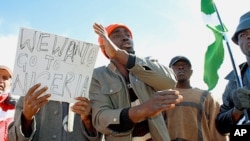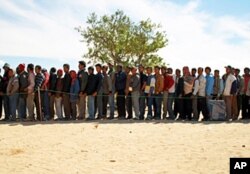More than 14,000 migrant workers and refugees who fled Libya's conflict are still waiting repatriation at a camp set up near the Tunisia-Libya border. Although the majority of Egyptians have been flown home, other nationalities are waiting for news from their governments and aid agencies.
Nigerian migrant workers who fled violence in Libya protested this week at a refugee camp set up on Tunisia's border with Libya, calling for help from their government to return home.
According to the United Nations refugee agency, there are about 200 Nigerians sheltering at the Choucha camp, 25 kilometers from the Libyan border.
Although the vast majority of Egyptians have now been repatriated, the camp is still housing 14,500 people who fled Libya.
In the meantime, refugees from Nigeria and other sub-Saharan African countries are having a harder time getting home.
Many of them say they were assaulted by Libyan security forces while trying to leave Libya.
Gyan Kwaku left Tripoli on Tuesday for the Tunisian border.
"They took my phone in the road...my TV, CD deck, everything...the policemen took everything in the road," Kwaku said.
Thirty-year-old Patrick Yaw, from Ghana, worked as a plasterer in Libya. He said Libyan security forces threatened him with violence.
"When we got to the border, they attacked us and collected our plasma TV, home theater, mobile phone, handset, they collect everything in your bag,” said Yaw. “They ask you to give out your money. If you don't give out, they will kill you. So, you don't want them to kill you, you give the money out. I don't have money at home but at least I have my life, so I can go back home to Ghana."
Other sub-Saharan Africans have reported being attacked by Libyan rebels who mistake them for mercenaries Libya's government is widely believed to have brought in to fight the uprising.
The U.N. High Commissioner for Refugees estimates that only 15 to 20 percent of Libya's migrant worker population of 1.5 million has been able to leave Libya. Concern is growing that government forces are preventing the migrants from leaving.
Many people at the Choucha camp said they left friends behind in Libya. Some workers who want to leave are unable to pay the taxi fare to the border, which can be the equivalent of one month's salary for an economic migrant working as a manual laborer in Tripoli.
Others are afraid of the threat of violence at the checkpoints.
UNHCR is also urging countries to offer resettlement opportunities for migrant workers from Somalia, Palestine, Iraq and Eritrea who had refugee status in Libya.
Valerie Amos, the U.N. Under-Secretary-General for Humanitarian Affairs and Emergency Relief, has visited the border and the camp. She said aid agencies are being prevented from entering western Libya to assess the humanitarian situation.
"My biggest worry is what is happening inside Libya itself,” Amos said. “We have not been able to get in over this western border. We need to get in, to see what the situation is like on the ground, to really have a feel for what the humanitarian needs are."
Although the flow of migrants into Tunisia has slowed, UNHCR is registering between 2,000 and 3,500 new arrivals every day.
The Choucha refugee camp, which is managed by the Tunisian army with the support of UNHCR, is rapidly expanding to prepare for a possible wave of new arrivals.
The site now has a hospital, football field and a dedicated family area. On Wednesday, clowns were brought in to entertain the migrants.











